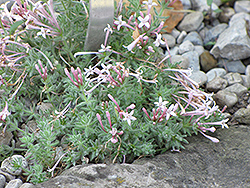Plant Height: 2 inches
Flower Height: 4 inches
Spread: 12 inches
Sunlight:
![]()
Hardiness Zone: 4
Description:
This selection is a wonderful addition to the rock garden or border edge with its interesting fuzzy gray-green foliage and white to pink trumpet flowers that emerge from pink buds in late spring; let it dry out between waterings, likes well drained soil
Ornamental Features
Woodruff is smothered in stunning clusters of shell pink trumpet-shaped flowers with white overtones at the ends of the stems from late spring to early summer, which emerge from distinctive pink flower buds. Its attractive succulent narrow leaves emerge green in spring, turning grayish green in color throughout the season.
Landscape Attributes
Woodruff is a dense herbaceous perennial with a ground-hugging habit of growth. Its relatively fine texture sets it apart from other garden plants with less refined foliage.
This plant will require occasional maintenance and upkeep, and is best cleaned up in early spring before it resumes active growth for the season. It is a good choice for attracting birds, bees and butterflies to your yard. It has no significant negative characteristics.
Woodruff is recommended for the following landscape applications;
- Rock/Alpine Gardens
- General Garden Use
- Groundcover
- Naturalizing And Woodland Gardens
Planting & Growing
Woodruff will grow to be only 2 inches tall at maturity extending to 4 inches tall with the flowers, with a spread of 12 inches. Its foliage tends to remain low and dense right to the ground. It grows at a medium rate, and under ideal conditions can be expected to live for approximately 10 years. As an herbaceous perennial, this plant will usually die back to the crown each winter, and will regrow from the base each spring. Be careful not to disturb the crown in late winter when it may not be readily seen!
This plant should only be grown in full sunlight. It prefers dry to average moisture levels with very well-drained soil, and will often die in standing water. It is considered to be drought-tolerant, and thus makes an ideal choice for a low-water garden or xeriscape application. It is not particular as to soil type or pH. It is somewhat tolerant of urban pollution. This species is native to parts of North America. It can be propagated by division.
